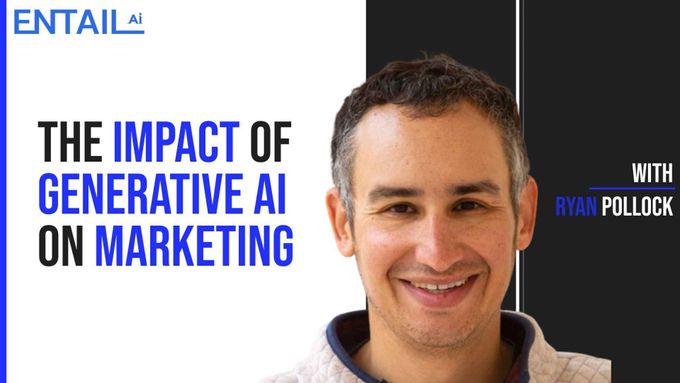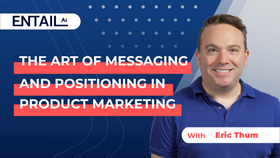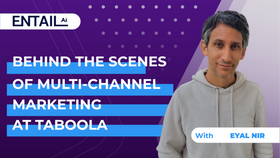Generative AI is a threat to Google: Ryan Pollock on the implications for marketers
With generative AI disrupting Search, Ryan unpacks what he calls "an absolute nightmare for Google" and the path ahead for marketers.
Updated February 28, 2024

AI Summary
AI tools like ChatGPT are challenging the very core of Google's business model and how people search. A big shift is coming as users move to a more personalized and seamless AI-driven experience.
To learn more, I talked with Ryan Pollock, an expert on all things marketing and AI. We covered a lot of ground in our conversation, but the key discussion points include:
- What role does AI play in content creation for marketing?
- How is generative AI transforming search behaviors? How does this affect traditional marketing strategies?
- Where should marketers focus their efforts to reach and engage their target audiences effectively?
One sentiment hit home. As Ryan puts it, "content strategy, what works, and how to grow a company in this AI era is all different now," but high-quality content is still key. Our talk also revealed plenty of valuable tips on navigating this fast-changing online world. Let's explore together.
Welcome to the Entail podcast where we host marketing leaders from various companies—mostly SaaS companies—and today I have the pleasure of having with me Ryan Pollock, ex Google, Mozilla, and DigitalOcean Senior Marketing Manager and CMO.
Hi Ryan, very glad to have you here with us today.
Thanks for having me, Tom.
So before we dive into generative AI and its role in marketing, already I feel like this is going to be an interesting conversation. Would you like to take a moment to introduce yourself and your background?
Sure. Yeah. So I'm in the US, I live in San Francisco. I moved here in 2002 after studying computer science at a good school back East. Spent a couple of years writing software at Oracle and joined a startup called JotSpot way back in '04. If you've ever used products like Atlassian Confluence or Notion, JotSpot was beating those products years ago. We got bought by Google in '05, and I've been doing marketing and product management at JotSpot. I spent the next nine years at Google, in the first iteration of their enterprise team, launching things like Gmail for work, then moved into mobile for a number of years. Around 2014, I moved to Google Cloud Platform in its early days and helped launch things like Kubernetes, which is now an industry standard.
A couple of years later, I joined DigitalOcean, a popular independent provider of cloud infrastructure. More recently, I worked at a competitor, a smaller company called Vultr, launching things like cloud GPUs and managed databases and so on. Since working on GPUs there, and I really do consider it a post-ChatGPT world that we're in now, I have been all the more obsessed with generative AI and its capabilities. I'm happy to speak on that and anything about my past experience and sort of how it informs my point of view.
The link between development and marketing
Okay, so just one thing that I'm curious about before we delve into generative AI. So you started as a developer you say, and you moved into product, which makes sense, development and product are close. But then you moved more into marketing as well. Often, development and marketing are seen as almost opposite extremes. So maybe you could you tell us a bit about that?
Well, I was always the super annoying straight-A student growing up. So, I had a lot of different interests, and I loved writing, reading books, and so on. In high school and college, I got into economics. It was around 2004, I discovered search engine marketing. To me, that was this really interesting fusion of, "Wow, there's numbers all over the place." It was all about making return on investments work and spending in a way that creates value instead of destroys value, I found that really interesting.
When I joined the startup JotSpot, we were about 10 people at the time. It was a really outstanding team, led by the guys who had started Excite. I fell into the opportunity to do marketing and product marketing. And I found for me it allowed me to be technical at times, while at the same time really think about "Well, what makes this product useful to an end customer? What's the story, what's the strategy?" And I've been able to span this universe, diving at times very deep into technology, but also working on consumer products at Google, really zooming out in a human way and at times having an emotional narrative, not just a purely rational one.
So anyhow, I've found for me that marketing is just this role that lets me scratch all these different itches that I have from my upbringing.
So, first of all, you don't see many people make this shift. Not a lot of developers move out of development because there's always a lot of need for them. But I think there are a lot of advantages to a person, to a marketer who understands development and understands code and all that, especially if you are marketing a tech product or a product that targets developers. That's one of the, probably most challenging and also quite expensive fields to be in. I mean expensive because I mean we do have clients in these industries like cyber and so on, where the cost of content creation is almost like the cost of writing code. Because you need people with that expertise right? So that can be super challenging there, right?
For the past several years, I've been more focused on marketing of infrastructure products and developer platforms, and I have decided to specialize in that even though I have done consumer at Google at least part of the time, it did ultimately occur to me the fact that I have this technical background makes me part of a smaller supply, if you will, of people who can actually bridge these different worlds.
Creating content with AI
Let's start moving into topics related to AI. I always say all companies and all brands need content in their marketing. And now there's a trend which I see in many companies and some of our clients as well. We see marketing leaders being pushed by their CEOs or other executives to drive down costs using AI and so on. You know, I think it actually started to stabilize, come to think of it, in the beginning after ChatGPT launched, it was more like an AI frenzy. And now people, they still want to use AI but it's a bit calmer than six months or a year ago.
But still, in my opinion, and that's also what we do at Entail, you want to use AI, but you want to be smart about it. The way we analyze it is, if you can create an endless amount of content with AI, it means it's even more of an inflation than it used to be even before AI. There was inflation even before, now it's hyperinflation. So doing more of the same will not help you stand out. Eventually, you know if you go into Google Search Console, there's this status called "crawled–not indexed" or "discovered-not indexed." That's where your content is going to go if you just create junk content.
So you need to move more toward expertise. That's why I also mentioned you being a developer and all that. So what's your take on that? How do you think a company should go about this?
Yeah, I think generative AI does, you know some people have said it brings the cost of content creation to zero. I have seen some people say that. I think that is a bit of a hyperbole, but for certain kinds of content, that's basically true. But for the really good stuff, I still think you're going to need human—probably more than oversight—collaboration, truthfully.
But we're living in a world where, I mean every day it's just unbelievable. I struggle mightily to consume the things that I would like to consume and also to figure out how to put back out into the world. There's a tension there. But I think the companies that continue to create content that engages their audience, in the world of developer marketing, it is really hopeful and uniquely so. Those are going to be the ones that I think will do quite well. One other thing I'll mention is over the past 10 to 15 years many kinds of companies have been held by Google search. I happened to work at one company, DigitalOcean, which is a cloud infrastructure provider, providing things like virtual machines, Kubernetes, databases, GPUs now. And a lot of that company's success is due to the fact that they were able to build a really impressive collection of content of tutorials and developer how-to deploy Ubuntu operating systems, MySQL databases, or MongoDB, what have you.
So, just to clarify, you're saying that, sorry for interrupting, but you're saying that now because of ChatGPT, for example, people can now ask ChatGPT how-to questions instead of going to that type of content like DigitalOcean had?
Yeah, personally, I use ChatGPT pretty much every time I want to learn something now. It's oftentimes my starting point. For me, I've been really curious to understand a lot more around what it means to build AI models, whether PyTorch or various other kinds of frameworks. For me, just learning so many things over the past year or really since a lot of this stuff took off, ChatGPT has been my teacher. And then, the second thing I do is go to YouTube. That's me.
But you know 10 years ago, it was Google. For the developer community, Googling things, spending a lot of time on Stack Overflow. So within the developer world, there's definitely been an earthquake, I would say, over the past year as to how you go about learning the things that so many people are trying to learn now. A lot is changing at a very, very quick rate.
So I mean, I'm not a developer, so I don't consume developer content, but I can tell you, for example, about a client of ours. They have an app for profit and loss calculations. And a lot of the content they used to do before, you know, like spreadsheet templates for PNL and things like that, and how to solve things on Excel and things like that. Nowadays if I need a formula in Google Sheets, I just ask GPT to write the formula, and write all the rules, and it writes this formula. So for this type of content, there's no reason to Google it anymore. So this query class I don't Google anymore; I just ask GPT. And I guess for many related questions, that's true as well.
Partly due to a supply increase of content, but partly it's also just the user experience of retrieving the content one is searching for is now fundamentally changed from you having to comb through 20 different links to now you have this seemingly omniscient chatbot that can, of course, be manipulated to retrieve things from the internet and so on.
The entire model is disrupted, at least if you're doing it right, in my opinion. And I don't think we're near a new normal yet. I would say there was a normal before ChatGPT, to me, where we're working towards figuring out what this is going to look like, but I don't think as an industry we're gonna have any equilibrium state, probably at least another 5 years. Things are always changing, but the rate of change is significant.
How AI is changing search as we know it
I definitely agree with that, it will take more time until the chips start to fall into place and we really understand where we're at. The market has definitely changed, and I think it's also interesting. I'll often speak about that, you know, that Google is still rolling out SGE, the Search Generative experience, which is not a very good name for this feature, I think.
Believe me, it's better than... Honestly, I left Google because of naming issues there. I can tell you that story sometime, but no joke.
Even though their algorithm updates, I often like the name. Like they have this new feature called Perspectives. I think it really encapsulates what the feature is about. But with SGE, it's super interesting how this rollout has been taking so long. They haven't released it to the entire population yet. So I think it's very interesting.
I just spoke about this in the previous podcast, but I think they have three priorities. The first priority is giving you the best results. Otherwise, you're going to leave them. The second priority, once you have the best results and the traffic, is to monetize it. So it's making sure that the ads work. And then, the third priority, which is a metric that I'm sure they measure—I don't have inside information on this, maybe you can share some. I'm sure they measure the click-through rate from their search results to the internet. Because if they stop sending or reduce the amount of traffic they're sending from the search results to the internet, people will create less content for Google and more for social media or wherever they get traffic from. And this means that Google will basically dry their source.
So I think that's the most important metric after the quality of the search results and monetization. And I think having all three work well is really the most important part before they can really open SGE to everyone. And I think they're not there yet. I think they're not there yet in terms of the quality of the results, right?
I left Google back in 2015 after my daughter was born, so I haven't been on the inside for many years now. But every aspect of that product was deeply instrumented. From my perspective, when I look at OpenAI in particular, it's such déjà vu for me. This company has come along, and to me, it feels so much like the Google playbook of old, but by accident. I don't think their business strikes me as one that was predicated entirely upon consumer intent to build this massive consumer business.
I don't know, and of course, they're having plenty of drama. They've had drama for years now in terms of people and layoffs and so on. But anyhow, I get why they've been cautious about all this. I think it's just so tremendously disruptive to their core product.
By the way, what do you think about what I just mentioned? Because I heard Satya Nadella, the Microsoft CEO, speak about Bing and incorporating ChatGPT, and he spoke about the traffic, how important it is for them to measure the traffic that they send from the search results to the internet, how that's one of the most important metrics that they measure.
So I'm just asking again. I know you haven't worked at Google for a while now, but do you think that's also a very important metric for Google to measure, like how they increase traffic? Because they say that every year, the amount of traffic going from Google to the internet increases every year, even though they have the snippet that shows the answers, so you don't necessarily have to go and read the article, but if you get the snippet, it generates a lot of traffic, and you have many different elements that could mean that the search ends there, and you don't need to click onto a website. But do you think that's a very important metric for them to measure, how much traffic they're sending to the internet?
Yes, let's just be precise about the definitions here. When I hear you say Microsoft or OpenAI is measuring the percent of queries that basically have to go out to the internet, I interpret that as basically when GPT is running, that's a model. It's got a bunch of parameters. It's basically just performing a calculation based on the words that were input to it. When I hear Satya say, "Oh, this is a query that's going out to the internet," to me, that's what everyone in the tech industry is calling retrieval augmented generation or REG. Where it's basically going out and fetching information from websites or it's running a Bing query or something like that, and it's augmenting the model's output with the context that was retrieved from the internet.
Whereas when I think of Google, maybe someone goes out to another site on the internet because the answer's not immediate. They have to click a button and navigate or something. So it's a little bit different.
That's why it's such an existential threat to Google's core business, why they went into, whatever, code red a year ago. That's why I questioned the viability of that product. If in a year we're not all talking to our iPhones like Joaquin Phoenix is doing in the movie Her, it's like, "What's wrong Apple? What's taking you so long here?" It might take a bit longer, but we're not far. So anyhow, the Google core business is to me very much in question.
If I understand you correctly, you're saying on one hand, and I haven't thought about it like this, so this is very smart, I think, but because people don't click to the internet, they also don't click ads, and so Google can't make money the same.
So that's why it's such a huge threat. But then you're saying, if this is a threat for Google, then it's also a kind of business model problem for ChatGPT because if ChatGPT can't produce clicks to a website, then it's also difficult for them to monetize.
They've launched an enterprise product, Teams product for SMBs, Microsoft somewhat oddly, in my opinion, is moving towards selling their co-pilot functionality for basically the same price points but under the Microsoft co-pilot brand as compared to OpenAI and ChatGPT. So anyhow, we're seeing a difference in business model and a willingness from, I would say, a certain class of consumer, certainly an enterprise business environment, to pay for AI capabilities.
I think that there's more work to do to make this the end-user experience I would like. I would like to just have a single AI subscription that I can carry with me to every application. That's what I posted a couple of times on LinkedIn, just "Hey, OpenAI, go do this. If you can just let me carry my OpenAI subscription everywhere, they're going to end up with 99% market share." But anyhow, it's going to be a new business model, and the ad-supported Google experience is basically going to be for people who don't make this transition.
Or for people that, for whatever reason, maybe don't have the funds to pay the $20 a month or whatever to OpenAI or potentially other model providers.
But don't you think that Google can compete with OpenAI? Because, if you look at the ChatGPT model, eventually, for me, the way I perceive this is just another layer on top of the search engine.
Eventually, you need to read the entire internet, crawl the entire internet, index all that information, reg that information, and so on. So basically, the search engine is a huge stepping stone on the way to the AI model that can get the information from the search engine. Because also on Bing, or on ChatGPT, if you ask it about, I don't know, like current news and so on, it goes, it searches on Bing, right? It searches for the information. So it is another layer on top of the search engine, and Google has the best search engine. They're much better than Bing.
The way I view it is that it's not a layer on top of the search engine. It's that the search engine is a utility for the model. And that's exactly what OpenAI has implemented within ChatGPT now. They treat the search engine as a utility. They happen to be in partnership with Microsoft, of course. So they use Bing, which still seems to be inferior to Google, as far as I can tell. But nonetheless, the model quality is good enough.
And you're right in saying I think Google can build a model that's probably comparable or better or maybe, who knows, to OpenAI. Where all of this kind of sits, as far as who wins here, it comes down to what's commonly called the access point, which is literally how does an end-user go ahead and initiate a query? Is it through the Chrome browser? Is it through Safari on an iPhone? Is it through an application? Is it through just pressing a physical button on a phone? All of these kinds of commonly called access points are going to ultimately, I think, dictate what happens here.
Microsoft, like weeks ago, made the announcement that they're adding for the first time in 30 years, a physical key to the PC keyboard. To engage with their co-pilot, which is OpenAI. We'll see, but there's no doubt that there's more in flux than I think there's been in decades.
And if I'm Google and I own Chrome and I have this business that depends on people clicking a link, I know that I can make these changes that are in consumer interest. They're not necessarily in the interest of the business. And that is the thing that has fundamentally changed because, for so long, what consumers have wanted to do has aligned with what also makes Google money, at least with the one exception being Google logging everything that the user ever does and completely mining data, that's been the one thing that's misaligned.
So anyhow, I didn't know I'd end up talking about all this today. I had other marketing-related things to talk about, but this is Google.
» More from the podcast: Lomit Patel talks organic marketing and UGC in SaaS
Working with AI and applying some humanity
I'm fascinated to the point of obsession with this topic because since ChatGPT launched, and since Entails business is grounded so much in search, we built a model. We call it the topical authority model, which I mean in essence tries to imitate Google and build an upside-down model of Google that can predict how to rank content.
And we look a lot at Google's model or the way we perceive it, because we don't have inside information as a kind of topical authority, but as a kind of an authority on what content you need to create and how this content should look like, because Google is the most almost universal. It's not one algorithm. It's hundreds of algorithms, but it's the most universal model like what content is the best content to answer a specific query? So I've been really obsessed with this since ChatGPT came out and seeing how we also adapt to this.
And yeah, let's bring this back home to marketing. I'll talk about the main strategy and our predictions, but in today's day-to-day, what do you think is the right way for marketers to use generative AI? Because you see all those get-rich-quick schemes on social media and all that. And it looks like complete bullshit. I had a podcast with this guy. He said that this prompt is not going to change your life. It's not. If you're doing a video about this, if you're watching a video about this, and then half a million people also watch this, they're doing the exact same prompt. It means that if you use it, you're not going to stand out because everybody is doing it. So what do you think is the right way to go about this, to use AI in your marketing?
Maybe this answers your question, but I'll show you probably because I think it's a bit funny and we're talking about it. But you had sent me prior to our discussion today, you had sent me a list of topics, so at least I wasn't totally blindsided as to what we'd be talking about.
And making this admission that anything that we might be asked to do, it's the white-collar working world of thought, is now worth consulting something that knows more than us.
And what I'm showing you here is somewhat of a joke, but at the same time not. Months ago now I basically, after OpenAI announced the ability to create custom GPTs, I basically cloned myself by feeding in my resume and about literally 30 minutes of me doing a soliloquy of a narrative about my experiences, opinions, and so on. So I've not even published this to the GPT store, by the way, but it's accessible.
But anyhow, I added this basically as an overlay atop of ChatGPT. And now, periodically, like I'll go, if someone sends me a bunch of questions over email. I get these requests to consult from time to time. And I find that whatever I can have this generate the answers to that more quickly.
The other day, someone wanted to talk to me about some data center stuff. And even before the call, he asked my GPT what it thought about edge data centers and how they would be useful for AI? So anyhow, the macro level point is for all, for us all as marketers is "let's be honest that we don't know everything," and suddenly, it might be worth consulting with various forms of AI to basically learn what it recommends. Of course, in seeing that you sent me this list of topics. I asked my GPT about half an hour before our call, "What do you think I should say?"
And I haven't, of course, talked about all these points. But I'd say that they're pretty darn good. They don't have all of the internal perspective I personally have about things like Google because I was the one that spent nine years on the inside of that place. But nonetheless, there's a lot here that maybe I wouldn't necessarily think of myself.
And as far as how does this change marketing work? I popped into Gamma earlier. I don't know if you're familiar with this tool, but a nice presentation maker. I happen to be out of credits at the moment, but I have in the past used this to drop in a bunch of text that ChatGPT has generated and then make some really beautiful slides. So I was playing very briefly this morning trying to get Google slides making some stuff. And needless to say, in a few minutes, I spent trying to get what they call Duet AI to make something pretty. I didn't actually manage to do it yet.
But anyhow, for marketers, all of this means, when it comes to strategizing, to writing, you would be foolish not to get the help that AI could provide. And then when it comes to actually producing all the different kinds of content, making it beautiful, etc., design and all these things, the tools continue to evolve at such warp speed.
Every day there's something I wish I had the time to try, but I'm still way behind on actually trying all the things I'd like to, which includes your product, by the way, Entail, so I'll plug that for you.
I'll show you a few things after the call.
The workflows and everything we do, as marketers, we have to admit to ourselves that the way we go about it is fundamentally different. And due to the changes in things like Google search, a lot of the things that maybe used to work, a lot of the sorts of content we might produce and so on, even SGE, so anyhow, this is a remarkably disruptive time to be in this industry.
So this GPT model that you trained basically. What's your opinion about that? How well does it perform? Do you think it can really provide answers on your behalf? Like even like insights and so on, or is it just superficial?
Yeah, I haven't even queried it myself as extensively as I'd like, but in my testing, it absolutely is already useful. It can certainly regale various stories of my career or otherwise make a plausible work. And I think its ability to just act in a way as my spokesperson is kind of there. I think about a future in which individuals in the industry are effectively represented by agents in a way as professional athletes.
I think that could be really interesting. So anyhow, it's already useful. I'm not exactly marketing it aggressively or anything like that. I would love to be able to have an audience of users that I could charge to talk to or whatever. I'm not there yet.
I think it's going to be super interesting to see. If we do reach a point where you can have an agent speaking on your behalf as a model, that's insane. I can't even grasp the implications of that. That's such a huge change.
Yeah. Even for professionals, whatever, I think that could be really interesting. But already there's different services. I think donotpay. com that you can basically have agents go and negotiate when, for whatever reason, you don't want to pay a bill.
But yeah, we're certainly heading towards a world in which we can have different kinds of AI agents work on our behalf. And yeah, there's definitely times when people ask me things, and I really wanted to say, "Hey, go talk to my GPT," sort of like how parents might ask a computer, "How do I do this?" Now the answer can be go ask Chat GPT or go ask this particular GPT. So anyhow, it's all this is a continuation of trends, but on steroids.
Where should marketers focus?
So there's a lot of uncertainty and a lot of speculation, but marketers have to sell products today. And I have that as well in my company, where we need to decide where we want to invest our marketing budget. So where do you think marketers should focus? Should they focus on search when search is changing? Should they focus more on social media? Paid channels? Paid is also very challenging now with privacy and so on.
I think every business is a bit different as to what makes sense to focus on. In the world that I am more focused on—let's say, developer platforms and infrastructure and those kinds of things—very common for people to talk about product-led growth, PLG, which to me, I find funny that has become this massive buzzword because in nine years at Google, that's all we ever did.
I agree with that completely. I mean, in consumer, they didn't even have a word for that. It was like breathing, right? Like PLG, that's what they do in consumer, and now they do it in B2B. They gave it a fancy name. Every consumer marketer has known this for at least two decades, right?
Yeah, so to me it's funny, but I think, you know, in the sorts of businesses that lend themselves to that—not everything does—but just making products easy to use, having quality marketing content that is simple and beautiful. And then figuring out just where is your audience, and up until now, a lot of the audience has been on Google.
A lot of it is still on channels like YouTube, and there's TikTok, which I refuse to go on personally, but if you're marketing to teenagers, then clearly...
It's insane. TikTok is insane.
Going where your audience is, that's rule number one. And different kinds of products have some have very broad audiences, some have very narrow audiences, and maybe high purchase prices.
Which brings me back to the economics background that I mentioned earlier. That's what it's about at the end of the day. We try to do something that is profitable, at least, especially in the world that we're now in, that suddenly people care about profits.
Yeah, I have to tell you that I think also in terms of, even if you think about ChatGPT and so on cause, because for SEO, if you want to optimize for search, there's tools like Phrase and so on that basically tell you how to write your article. They read the first SERP, they get the first 10 results, and they tell you how to structure your content so that it's like the first 10 results, which I'm very much against because if it tells you how to create content, that's more and more like the search results. It means that ChatGPT can create very similar content. Like the closer your content is to the machine content, it's closer to that example of the Google Sheet formula. It's something that ChatGPT can create. It's the opposite of human content, but SEOs are into that. Okay, there's a tool that tells me how to write things. I don't need to think too hard. I don't need to do any research really. And then I just use these tools. I don't like it.
But on the other hand, when you think about ChatGPT can also point you into what product to use. You can compare products. I wanted to buy a baby stroller, so I asked ChatGPT, can you compare a Bugaboo, and I forgot the other brands. I ended up buying the Bugaboo stroller. Not because it's ChatGPT, by the way. I ended up because of a review on YouTube that was very good. The guy was extremely good. He repairs strollers and things like that. He's the guy to create that content and really shows you like all the ins and outs, how to select a stroller. So I'm very much for that type of expert content and like those where you can see real expertise.
But my point is, if you can create content, if you can optimize content for search, and you can understand the logic behind it, there must be a logic of how you want to optimize content to be featured or to appear in the ChatGPT answer, but it's so unpredictable. But I'm sure companies, they're going to want more and more to be there. The more people use these tools and ask them questions, you're bound to appear in those answers as long as you provide good content that the model is going to use to formulate its own answers. So what's your take on that?
Yeah. I think we will see. I'm not an expert in the various tools that have been created to try to understand exactly what's going on as far as Google trends, but there's obviously an industry of tools to try to provide further analysis atop Google itself.
But yeah, the ranking within generative AI responses from ChatGPT or potentially other models. I think that there's already some things that I've just seen mentioned in newsletters that try to do this. But yeah, I think we'll see more and more. There will be new tools to help people rank in AI. There will be also more attention paid to how to exclude yourself from that due to things like copyright issues. Some businesses are going to want to be in the generated responses for the New York Times, hell no. But yeah, it's all evolving in real-time.
I think, by the way, and we are over time, so maybe we'll finish with that because this has been a very interesting conversation. But I think we're talking about ChatGPT and how it changes Google and search and how disruptive it is. But then on the other hand, TikTok is just as disruptive as well for Google. I think more people, especially the young generation, prefers TikTok over Google search engine and prefers it over ChatGPT as well because they're looking for the human experience. They're looking for that reality-type content to really know which restaurant to choose or what shoes to buy or whatever. So I think that's just the other side of the spectrum. So Google it seems like two huge companies appearing almost out of nowhere, and they're taking away their market, right? But that's a completely different thing.
TikTok is less of a Google replacement, I think. TikTok is obviously more of a problem for Meta (Facebook, Instagram) and for YouTube. That's why YouTube has done YouTube shorts now. But yeah, to me, they serve different purposes as far as what is the consumer problem in the moment. Google has always been about getting someone in and out as quickly as possible, whereas TikTok, Facebook, or Instagram are about the opposite of that. It's like, how can we keep this person here as long as possible? So, they are different things. In some ways, they may end up similarly informing consumer product selection or what have you, but they're different. YouTube tends to be where people go for longer-form content, and TikTok is for that 15-second fix that sometimes turns into hours for people. But yeah, TikTok is another thing.
Okay, that was fun.
Yeah, it was very interesting. You definitely sound different than many marketers I speak to, and that has to do probably with who you are and a lot about your background. So you look at it more like also as a developer. Not many marketers have this perspective, so it's been very informative. I learned quite a lot.
Yeah, so thanks a lot. Been a pleasure talking to you. And yeah, hopefully, we can also catch up in a few months, see how things have changed. Because like I said, the market is moving so quickly. Perspectives also will change very quickly now.
Yeah. Alright, we'll be in touch. And looking forward to putting this out.
Thank you very much, Ryan.








